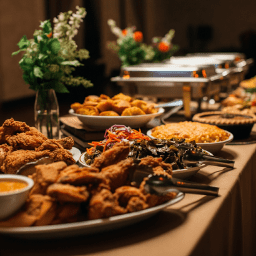Catering plays a vital role in transforming events, from intimate gatherings to grand galas, by providing delicious food and seamless service.
Understanding the various types of catering services and catering contracts and the occasions that call for them is essential for anyone in the industry.
This article explores the growing demand for catering, the advantages of hiring professional services, and effective strategies for scaling your business.
It also addresses the challenges you may face along the way, ensuring you are well-equipped for success in this dynamic field.
- What Is Catering?
- What Are the Different Types of Catering Services?
- Understanding the Demand for Catering Services
- Scaling Your Catering Business
- Strategies for Scaling Your Catering Services
- Challenges and Considerations for Scaling
- 1. Managing Costs, Finances, and Budget Planning
- 2. Maintaining Quality, Consistency, and Quality Assurance
- 3. Adapting to Changing Demands and Culinary Trends
- What Are Your Goals for Scaling Your Catering Services Through Innovation and Creativity?
- How Will You Continue to Grow and Adapt in the Industry?
- Frequently Asked Questions
- What types of events can your catering services accommodate?
- Do you offer customizable menu options for each event?
- Can you provide staff for service during the event?
- Do you provide rental equipment for events?
- How do you handle the logistics of catering for a large event?
- Can you accommodate last-minute changes or additions to the event?
What Is Catering?
Catering refers to the service of providing food, beverages, and other associated services such as table settings and floral arrangements for events ranging from intimate gatherings to grand galas. It plays a crucial role in event planning and venue selection, ensuring that the guest experience is memorable and aligned with the theme of the occasion. Catering encompasses various aspects including menu design, food presentation, and service staff management and staff training, all aimed at enhancing customer satisfaction.
At its core, catering is more than just delivering a meal; it is about curating a culinary experience that resonates with the guests and complements the event’s atmosphere.
Culinary expertise shines through in carefully crafted menus that cater to diverse dietary needs and allergen management and preferences, ensuring no guest is left unsatisfied. The meticulous attention to detail in food presentation adds an aesthetic appeal that elevates the entire dining experience.
Service excellence plays a vital role, as professional staff ensures smooth operations and fosters a warm, welcoming environment. Therefore, effective catering significantly contributes to the overall success of any event, making it a vital component of event planning.
What Are the Different Types of Catering Services?
Catering services come in various forms, each tailored to meet the unique needs of different events such as corporate gatherings, weddings, and birthday parties. Understanding the distinctions between buffet style, plated service, and cocktail receptions helps in selecting the right service for enhancing guest interaction and ensuring satisfaction. Each type requires specific logistics management and logistics coordination and culinary creativity to execute effectively.
Buffet style offers flexibility, allowing guests to serve themselves while accommodating a wide array of dietary restrictions, ensuring everyone finds something to enjoy.
On the other hand, plated service provides a more formal atmosphere, where meals are pre-portioned for guests, often requiring dedicated service staff to attend to diners’ needs.
Cocktail receptions, characterized by a more casual setting, provide bite-sized appetizers that encourage mingling, but also necessitate careful planning around food safety to prevent any potential spoilage.
Knowing the right catering format for an event can significantly enhance the overall guest experience.
Understanding the Demand for Catering Services
The demand for catering services has escalated significantly in recent years due to the rise in event planning, social gatherings, and corporate functions.
Clients increasingly seek professional catering to ensure their events—from weddings to holiday parties—are executed flawlessly, with a focus on culinary expertise and customer satisfaction.
Catering services address various needs such as menu design, dietary restrictions, and logistics management, reflecting current catering trends.
What Are the Occasions That Require Catering Services?
Catering services are essential for a wide range of occasions, including weddings, corporate events, birthday parties, and holiday gatherings. Each type of event presents unique challenges and opportunities, requiring careful planning and menu design to cater to diverse tastes, dietary restrictions, and event themes.
For instance, a wedding demands not only exquisite culinary presentation but also attention to thematic elements, such as seasonal ingredients and color schemes that match the decor.
Corporate events often require a focus on efficiency and a variety of options to accommodate busy schedules, providing quick yet flavorful meals with portion control that impress clients and employees alike.
Meanwhile, birthday parties might call for playful, themed menus that reflect the celebrant’s personality, balancing fun and gourmet choices.
Client feedback plays a crucial role in tailoring these experiences, ensuring each gathering is memorable and enjoyable for all attendees.
What Are the Benefits of Hiring a Catering Service?
Hiring a catering service offers numerous benefits, including enhanced guest experience, professional culinary expertise, and seamless event execution. With specialized knowledge in menu design, food presentation, and portion control, catering services take the pressure off hosts, allowing them to focus on enjoying their event. By ensuring quality assurance and health regulations and service excellence through personalized service, professional caterers help create memorable experiences for all attendees.
One of the standout advantages of engaging a catering service lies in their commitment to customer satisfaction, where attentive client consultation ensures that preferences and dietary restrictions are met.
This level of service customization guarantees that each gathering is tailored to the specific needs of the host and their guests.
Catering professionals manage logistical challenges such as timely delivery and on-site setup, alleviating stress for those organizing the event.
They also prioritize food safety, adhering to stringent health guidelines to protect customers and provide peace of mind.
All these factors combine to enhance marketing strategies including social media promotion, as a well-catered event can elevate an organization’s reputation and foster positive word-of-mouth.
Scaling Your Catering Business
Scaling your catering business involves expanding operations to meet increasing demand while maintaining quality and service excellence. This process includes refining logistics management, enhancing client relationships, and adapting to the latest catering trends and cultural cuisines.
By understanding the importance of scalability, catering businesses can identify opportunities for growth through business growth and streamline their services to maximize customer satisfaction.
What Does It Mean to Scale a Business?
Scaling a business means increasing its capacity to serve more clients and generate increased revenue without compromising on quality or service excellence. In the catering industry, this involves optimizing operations, enhancing client retention strategies, and effectively managing resources. Understanding the principles of scaling helps catering businesses to not only expand but also to thrive and implement sustainable practices in a competitive market.
While simply increasing sales might suggest a higher number of transactions, true scaling requires a nuanced approach that includes incorporating client feedback during tasting events to consistently refine service offerings and customize experiences tailored to individual preferences.
It also involves strategic marketing initiatives that build brand loyalty and recognition, allowing for smoother transitions as operations grow. By focusing on sustainable growth, catering businesses can cultivate lasting relationships and adapt their offerings, ensuring they maintain excellence while tapping into new markets or expanding existing ones.
Why Is Scaling Important for Catering Services?
Scaling is crucial for catering services as it allows businesses to adapt to market demands, improve customer engagement, and enhance overall operational efficiency. With the ever-evolving nature of event planning, catering businesses must be able to expand their services, menu options, and staffing to meet diverse client needs. Properly scaling operations can lead to increased profitability and long-term sustainability.
In this competitive landscape, the ability to implement effective event coordination strategies becomes essential.
By scaling effectively, catering services can stay ahead of food and beverage trends, incorporating culinary innovation that attracts a broader clientele and fosters repeat business and maintain client relationships.
As customer expectations continue to shift, catering providers that can swiftly respond to these changes not only boost their market adaptability but also enhance their overall reputation.
The link between scaling and customer satisfaction is particularly significant, as businesses that offer tailored and flexible solutions tend to cultivate stronger relationships with clients, ensuring both immediate success and future opportunities.
Strategies for Scaling Your Catering Services
To scale your catering services effectively, implement strategies that leverage your strengths while addressing market demands. Key strategies include:
- Expanding your menu options
- Investing in quality equipment
- Hiring skilled staff
- Enhancing marketing initiatives
By focusing on these areas, catering businesses can improve client relationships and ensure high standards of service excellence.
1. Expanding Your Menu Options
Expanding your menu options is a vital strategy for scaling your catering services, as it allows you to attract a broader clientele, from intimate gatherings to grand galas, and cater to diverse tastes. Incorporating seasonal ingredients and specialty cuisine can elevate your offerings and enhance the guest experience, showcasing your culinary creativity, culinary expertise, and innovative menu design. This adaptation can also help you meet dietary restrictions and embrace cultural cuisines, making your services more inclusive.
Embracing popular culinary trends not only keeps the menu fresh but also engages clients eager to explore new flavors, seasonal ingredients, and culinary trends.
Food presentation and styling play a crucial role in this process, as beautifully presented dishes not only appeal visually but also elevate the perception of quality and enhance guest experience.
Taste testing among different demographic groups ensures that the offerings resonate with various palates, fostering customer satisfaction, loyalty, and repeat business.
Consequently, a well-thought-out menu expansion not only shows attention to detail but also positions a catering service as a leader in the dynamic food scene and a master of event planning.
2. Investing in Quality Equipment, Supplies, and Logistics Coordination
Investing in quality equipment and supplies is essential for any catering business looking to scale effectively. High-quality catering equipment not only ensures food safety and proper food handling but also enhances food presentation, service aesthetics, and supports efficient logistics coordination, ultimately contributing to an improved guest experience through seamless service and venue selection. This investment is crucial for maintaining operational efficiency and service excellence.
Such equipment plays a pivotal role in effective inventory management, allowing for better tracking of supplies and reducing waste.
Using reliable tools, catering equipment, and appliances can aid in the smooth execution of culinary workshops, where chefs can hone their skills without the hindrance of subpar gear.
When coupled with strong logistics management practices and event timeline coordination, top-notch supplies can streamline the preparation and delivery processes, ensuring that every dish, from hors d’oeuvres to plated service, arrives both on time and at peak quality.
This holistic approach not only elevates the catering service but also fosters customer loyalty and reputation growth.
3. Hiring, Training, and Managing Service Staff
Hiring and training staff is a fundamental component of scaling your catering services, as a skilled team is vital for delivering exceptional service and enhancing the guest experience and ensuring exceptional service from start to finish. Ongoing staff training ensures that your team is well-versed in culinary presentation, food safety standards, allergen management,, and customer interaction, which are essential for maintaining service excellence and client satisfaction at events.
By prioritizing comprehensive training programs, catering businesses can foster strong client relationships, encourage client feedback, and tailor their offerings to meet individual needs.
This focus on staff development not only elevates culinary expertise and personalized service but also promotes a culture of service customization, where team members feel give the power toed to engage with guests effectively and adapt to various event types.
A well-trained staff can anticipate clients’ preferences, respond to inquiries promptly, manage RSVP management, and create memorable interactions that resonate long after the event has concluded.
Ultimately, investing in employees’ skills translates to delighting customers and bolstering the reputation of the catering brand and ensuring business growth.
4. Marketing and Advertising
Implementing effective marketing and advertising strategies is crucial for scaling your catering services and attracting new clients. A strong online presence, bolstered by social media marketing and online ordering, can enhance brand visibility and engage potential customers. By utilizing various marketing strategies, promotional materials, and tactics, catering businesses can effectively showcase their unique offerings and culinary expertise.
Plus social media platforms, leveraging influencer partnerships can significantly boost customer engagement, as trusted figures can help validate a caterer’s brand in the eyes of potential clients.
Event promotion becomes a key focal point as well, creating opportunities for lead generation while providing a chance to demonstrate exceptional service and quality firsthand.
Coupled with consistent branding efforts, these strategies make it easier for catering services to create memorable interactions that resonate with their audience, ultimately leading to a loyal customer base eager to share their positive experiences.
5. Partnering with Other Businesses
Partnering with other businesses can significantly enhance your catering services by expanding your reach and offering complementary services. Collaborating with event planners, florists, or entertainment providers allows for streamlined vendor coordination and creates a comprehensive experience for clients. These partnerships can also lead to valuable referrals and strengthened client relationships.
By engaging with local vendors, the service provider not only boosts community engagement but also increases the likelihood of successful contract negotiations that benefit all parties involved.
Such collaborations can result in bundled offerings and cross promotions that clients find irresistible, enhancing overall customer satisfaction. This teamwork encourages each business to promote the others through well-structured referral programs, thereby fostering a network of trust and reliability.
By uniting capabilities and resources, businesses can work together to drive innovation and deliver exceptional quality, ultimately creating a win-win situation that fosters teamwork and collaboration for everyone involved.
Challenges and Considerations for Scaling
While scaling a catering business presents many opportunities, it also comes with its own set of challenges, including timing and venue capacity, that must be navigated carefully. Issues such as managing costs, maintaining quality assurance, and adapting to changing demands can significantly impact the success of your catering services.
Understanding these challenges is essential for developing effective strategies to overcome them and ensure sustained growth.
1. Managing Costs, Finances, and Budget Planning
Managing costs and finances is a critical challenge for catering services looking to scale. Effective budget planning allows businesses to allocate resources efficiently, ensuring that operational costs remain manageable while still delivering high-quality food and service. This financial acumen is essential for sustainable growth and eco-friendly practices within the competitive catering industry.
For maintain a competitive edge, catering businesses must also implement robust inventory management practices and catering contracts that minimize waste and optimize product usage.
By closely monitoring stock levels and anticipating demand fluctuations, they can reduce unnecessary expenditures and ensure that lower-quality substitutes are never employed.
When considering the implications of scaling, it is vital to reassess pricing strategies and service offerings regularly.
By keeping a pulse on market trends and customer preferences, a caterer can make informed decisions using competitive analysis that align with both financial goals and quality assurance, leading to long-term viability and customer satisfaction and long-term viability.
2. Maintaining Quality, Consistency, and Quality Assurance
Maintaining quality and consistency is paramount for catering services, especially when scaling operations. As businesses expand, ensuring that the quality of food, service, and overall guest experience remains high, with emphasis on RSVP management and is essential for customer satisfaction and brand reputation. Implementing quality assurance measures and regular feedback loops can help maintain these standards.
To achieve service excellence, catering businesses can adopt a systematic approach that includes training staff rigorously and developing standardized recipes that embody culinary creativity.
Fostering strong client relationships through personalized service and attention to detail can set a brand apart.
Gathering customer feedback not only helps refine menus and service offerings but can also unveil hidden preferences that elevate the overall experience, ensuring that each event reflects the unique needs, event themes, and tastes of clients.
By prioritizing these strategies, catering services can confidently scale while consistently delivering exceptional results and maintaining industry standards.
3. Adapting to Changing Demands and Culinary Trends
Adapting to changing demands is a challenge that every catering service must face as they scale. The preferences of clients evolve, influenced by culinary trends, event planning, dietary needs, and event expectations. Catering businesses that stay ahead of these changes through market research and client consultation can position themselves for success and retain their competitive edge through innovation and creativity.
To effectively navigate this landscape, these services must prioritize food innovation and harness the power of seasonal ingredients.
By tapping into real-time consumer insights and leveraging marketing strategies, they can tailor their menus to reflect the latest trends while ensuring freshness, portion control, and quality.
Engaging with guests not only fosters loyalty but also provides valuable feedback that drives future offerings.
Innovative menu design that embraces versatility, sustainable practices, can cater to diverse dietary restrictions, further enhancing the overall dining experience.
The combination of strategic planning and creativity enables catering teams to remain relevant, engage with customer demographics, and resonate with their clientele.
What Are Your Goals for Scaling Your Catering Services Through Innovation and Creativity?
Establishing clear goals for scaling your catering services is crucial for effective growth and development. Goals may include increasing customer engagement, expanding service offerings, or enhancing brand visibility through strategic marketing initiatives and social media promotion. By defining these objectives, catering businesses can focus their efforts on customer satisfaction and measure success in achieving their scaling ambitions.
Setting these goals not only drives client retention but also fosters an environment where service customization and menu design can thrive.
By closely monitoring catering trends and understanding client preferences, catering services can tailor their offerings with personalized service and portion control, ultimately enriching the customer experience.
This strategic alignment between objectives and client needs is essential in optimizing operational efficiency, ensuring that resources are allocated effectively to meet growing demands, adapt to changing market conditions, and manage event logistics.
How Will You Continue to Grow and Adapt in the Industry?
Continuing to grow and adapt in the catering industry requires a commitment to innovation, creativity, and responsiveness to market trends. Businesses must regularly evaluate their offerings, customer feedback, and operational strategies to ensure alignment with evolving client expectations. Embracing culinary innovation, sustainable practices, and local sourcing can also enhance brand loyalty and attract new customers.
To achieve service excellence, event coordination and planning should be flawless and attentive to detail, with a focus on creating memorable experiences for guests.
Pursuing quality assurance in every dish served not only boosts customer satisfaction but also reinforces the brand’s reputation in a competitive market, especially when serving a diverse range of event types from intimate gatherings to grand galas.
Integrating technology for efficient communication and feedback collection can provide valuable insights, allowing catering businesses to swiftly adapt their menus and services based on consumer preferences and audience engagement.
Leveraging these strategies effectively positions businesses for long-term success and cultivates a loyal client base eager for future engagements, ensuring repeat business and strong client relationships.
Frequently Asked Questions
What types of events can your catering services accommodate?
Our catering services can accommodate a wide range of events, from intimate gatherings such as birthdays and anniversaries, to grand galas such as weddings and corporate events. We also offer assistance with venue selection and event timeline planning to ensure a seamless experience.
Do you offer customizable menu options for each event?
Yes, we work closely with our clients to create a customized menu that fits their specific event and budget. Our menu customization includes a variety of options, accommodating dietary restrictions, cultural cuisines, and food presentation preferences.
Can you provide staff for service during the event?
Yes, our catering services include professional and experienced service staff to ensure a seamless and enjoyable dining experience for your guests. We have servers, bartenders, and other event staff available for hire, all trained to enhance the guest experience.
Do you provide rental equipment for events?
Yes, we offer catering equipment rental such as tables, chairs, linens, and dinnerware for events. Our team will work with you to determine the necessary rentals, including theme decor and table settings, for your specific event and take care of the delivery and setup.
How do you handle the logistics of catering for a large event?
We have a team of experienced event planners who will work with you to plan and coordinate all aspects of the catering for your event. This includes menu planning, rental equipment, staff training, and any other logistical details such as event permits and health regulations to ensure a successful event.
Can you accommodate last-minute changes or additions to the event?
We understand that events can sometimes have unexpected changes or additions. Our team will do our best to accommodate any last-minute changes or requests, including adjustments to the event flow and guest counts, but please note that additional fees may apply.






